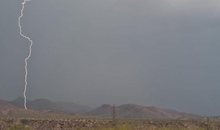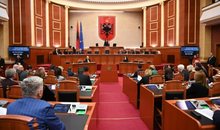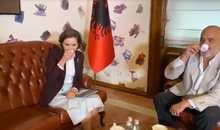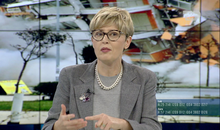
 Flash News
Flash News
Ersekë/ Elderly man struck by lightning, dies on the spot
KAS vendos hapjen e 229 kutive të materialeve zgjedhore të Qarkut Vlorë
Fraud and money laundering, 9 thousand square meters of land seized in Fushe Preza
Constitutional Court reviews TikTok shutdown decision
Murder of Ermir Dedja, two people arrested, smuggled the vehicle used by the perpetrators

He is also among those who assess that one of the main obstacles to the recognition of Kosovo by the Holy See is ecumenism, or inter-church dialogue for reconciliation between Christian churches: Catholic, Orthodox, and Protestant.
The division of the Catholic and Orthodox Churches occurred about ten centuries ago, while the Protestant Church split from the Catholic Church in the 16th century. Ecumenism finally gained momentum in the second half of the 20th century and continues today.
The Russian Orthodox Church and the Serbian Orthodox Church oppose Kosovo's independence. In this context, Don Shan Zefi estimates that the Holy See takes into account all world politics and may have its own reservations about recognizing Kosovo as a state.
"Of course, from the Orthodox [Orthodox Christian world] side, there are objections that Kosovo should not be recognized or that it is still too early to recognize it. It is expected, from a diplomatic point of view, that Serbia should recognize Kosovo, have relations with Kosovo, and then intervene," says Don Shan Zefi.
Publicist Engjëll Koliqi, who lived in Italy for two decades since 1990 and was a journalist for Vatican Radio for several years, has a similar opinion. He says that the Vatican knows the reality of Kosovo and proof of this is the constant communication that the Holy See has with the country's institutional leaders.
Koliqi expresses his belief that the current lack of formal legal recognition for Kosovo is related to the Vatican's avoidance of consequences in the ecumenical dialogue.
"Inter-church dialogue is underway for the unification of Christians, and with this recognition [of Kosovo by the Vatican], the Serbian and Russian Orthodox would be enraged and everything would fail," Koliqi emphasizes in a written response to Radio Free Europe.
Albert Prenkaj, former ambassador to Rome from 2008 to 2012 and former political director of the Ministry of Foreign Affairs of Kosovo in the period 2013–2022, also sees ecumenical dialogue as one of the causes of the Vatican's non-recognition of Kosovo.
He says that in the first communications between the Vatican and Kosovo, the latter was told that the Vatican only recognizes countries that are members of the United Nations.
"Kosovo is not a member of the UN yet. Meanwhile, the Serbian Orthodox Church or the Belgrade Patriarchate is always a problem during this journey. So, we know what the position of the Belgrade Patriarchate, but also the state of Serbia, has towards Kosovo," Prenkaj emphasizes.
Serbia opposes Kosovo's independence and considers it part of its territory, even according to its own Constitution. In this context, the Serbian state has had and continues to have the support of the Russian Federation.
However, according to Prenkaj, Kosovo has continuously insisted on receiving recognition from the Holy See, presenting its arguments./ REL
Latest news


The first case of small cattle plague in the country is confirmed
2025-06-04 22:36:54

Blushi: The person who kidnapped Meta became police chief
2025-06-04 21:45:24
"Fraud" with the forgiveness of State Police fines!
2025-06-04 21:15:22



"The real reason why young Albanians like me are coming to the UK illegally"
2025-06-04 20:07:39
Government opens a legal path for investments in Army properties
2025-06-04 19:49:25
Elderly woman forgets stove on, house burns down in Vlora
2025-06-04 19:46:42

Ersekë/ Elderly man struck by lightning, dies on the spot
2025-06-04 19:12:55
Trump calls Putin, warns Ukraine that Russia will respond to attack on airbases
2025-06-04 19:05:56
Zelensky's Chief of Staff Meets with Secretary Rubio in Washington
2025-06-04 18:53:37

Rama opens a legal "path" for investments in Army properties
2025-06-04 18:41:33
How to think like a Stoic
2025-06-04 18:19:02

May 11th Elections/Balliu: The European Parliament condemned the electoral farce
2025-06-04 18:05:14


Tirana Pyramid “symbol of exclusion” for people with disabilities
2025-06-04 17:32:27



SPAK sends Evis Berberi, Belinda Balluku's right-hand man, for trial
2025-06-04 16:39:23


Reporting to the Parliament of independent institutions postponed indefinitely
2025-06-04 16:11:48

Turkish court jails five mayors of largest opposition party
2025-06-04 15:56:26



KAS vendos hapjen e 229 kutive të materialeve zgjedhore të Qarkut Vlorë
2025-06-04 15:04:47


Flax seeds, positive and negative effects of their consumption
2025-06-04 14:45:19
Housing costs are not increasing, apartment prices are
2025-06-04 14:39:07

A 51-year-old man was injured while working at the ferrochrome plant in Elbasan.
2025-06-04 14:14:12




Italian university engulfed in flames, student evacuation begins quickly
2025-06-04 13:28:22
39-year-old woman disappears in Gjirokastra, husband: She didn't come home
2025-06-04 13:15:24

The saga of failures to constitute the Kosovo Assembly continues!
2025-06-04 12:56:25
Government villas will be turned into luxury hotels
2025-06-04 12:51:21
Artan Tafani testifies for the first time against Laert Haxhiu's gang
2025-06-04 12:24:57

Scary figures: 8 in 10 Albanians believe the healthcare system is corrupt
2025-06-04 12:08:18


Constitutional Court reviews TikTok shutdown decision
2025-06-04 11:45:24
75-year-old man disappears in Korça! His wife: He has been gone for two days
2025-06-04 11:32:25





Iran rejects US demand for uranium enrichment
2025-06-04 10:15:32
Hoxha: An Albanian was caught distributing cocaine in the Russia-Ukraine war
2025-06-04 10:01:32
A safe was robbed, two people were arrested in Tirana
2025-06-04 09:54:36
Popular singer Jessie J diagnosed with breast cancer
2025-06-04 09:49:34
Young man arrested in Lazart for carrying gun and gun in apartment
2025-06-04 09:33:08
Call center fraud, two arrested in Tirana
2025-06-04 09:24:53

How is China exploiting the West's retreat to expand its presence in the region?
2025-06-04 09:07:32
Over a million pilgrims begin Hajj pilgrimage
2025-06-04 08:52:44

Banks ask the Bank of Albania to facilitate loans for PPPs in infrastructure
2025-06-04 08:29:07
Horoscope, what do the stars have in store for you today?
2025-06-04 08:16:36

Morning Post/ In 2 lines: What mattered yesterday in Albania
2025-06-04 07:47:17
Analyst: Political acts have damaged Albania more than criminal gangs
2025-06-03 23:00:19


Baçi: Rama was afraid of popular discontent, stole more votes than he thought
2025-06-03 22:10:14




9 months after taking office, the Chief of the Guard, Ermal Onuzi, resigns
2025-06-03 20:14:09

15-year-old injured by gunfire at 'Ali Demi' pizzeria, police arrest perpetrator
2025-06-03 19:32:04

Why don't I want to spend a single day in Vlora?!
2025-06-03 18:26:21
Tech-stinction alert: Will humanity shrink to just 100 million people?
2025-06-03 18:02:23
EPP accepts Berisha's request: A fact-finding mission will be sent to Albania
2025-06-03 17:49:47
Three vehicles collide in Elbasan, several injured suspected
2025-06-03 17:45:02
Prosecutor Marsida Frashëri faces a request for dismissal at the KPA
2025-06-03 17:21:57
Nga Holanda në Finlandë, si operonte rrjeti shqiptar i drogës
2025-06-03 17:10:34

Tusk kërkon votëbesim në parlamentin polak më 11 qershor
2025-06-03 16:59:01


